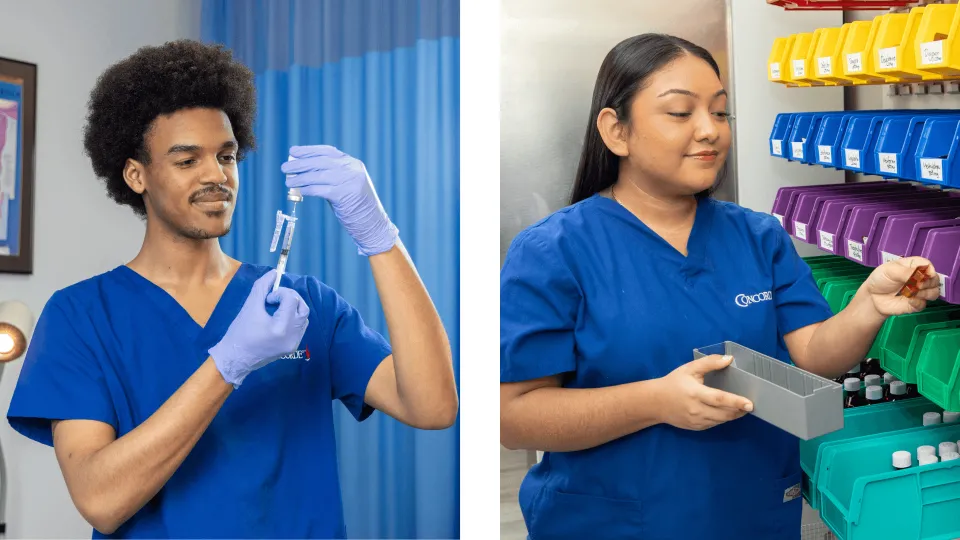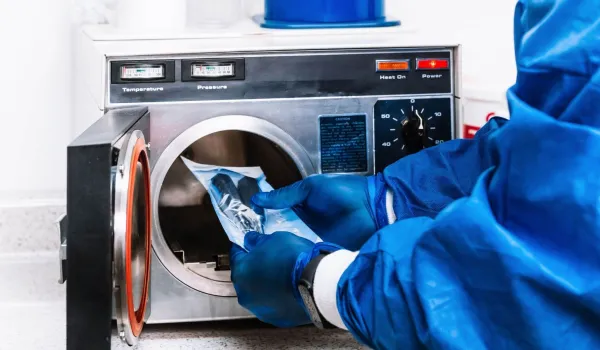
Medical assistants are healthcare professionals who perform administrative and clinical tasks. This versatility makes them valuable assets in physicians' offices and other health care environments where they collaborate with colleagues to ensure efficient patient care.
The U.S. Bureau of Labor Statistics projects a 15% growth in employment opportunities for medical assistants between 2023 and 2033, nearly four times the national average for all jobs. With around 119,800 job openings every year, this profession could be a good career choice for those interested in training for a job in the health care sector.
What is a Medical Assistant?

What Medical Assistants Really Want You to Know
A medical assistant is a trained health care professional who manages administrative and clinical tasks in a physician's office, clinic, hospital, or other health care facility. Their primary duties for a medical assisting job include caring and advocating for patients. Medical assistants are responsible for:
- Maintaining confidentiality and patient privacy
- Adhering to all safety policies and procedures
- Respecting the patient and their culture without any personal bias
- Acting with professionalism
- Adapting in response to communication barriers to effectively share information with patients and families
- Maintaining accurate patient records
- Establishing rapport with patients
- Ensuring all parties understand the patient's care plan, including home care responsibilities, scheduled tests, and follow-up appointments
Clinical Duties
A certified medical assistant job includes various clinical duties under the direction of a nurse or physician. Their scope of practice varies by state. Common duties for a medical assistant include:
- Recording the patient's medical history
- Measuring a patient's vital signs, such as weight, height, and blood pressure
- Explaining procedures to patients
- Preparing patients for examinations or treatments
- Assisting the physician or nurse during an examination
- Preparing and administering medications as directed by a licensed health care provider
- Performing wound care
- Collecting and preparing laboratory specimens
- Performing basic laboratory tests
- Taking blood
- Performing electrocardiograms
- Transmitting prescription refills
- Entering patient details, test results, and other information in medical records
- Disposing of contaminated supplies
- Sterilizing medical instruments
- Preparing the examination room for procedures between patients
In most states, medical assistants administer injections, including vaccinations, under the instruction of a licensed professional. Properly trained medical assistants also perform phlebotomy, which entails collecting blood samples from patients. In some states, these tasks require additional licensure.
Administrative Duties
Medical assistants manage administrative tasks that help the physician's office or hospital run smoothly. Some of the typical administrative tasks for a medical assistant include:
- Scheduling patient appointments
- Answering telephones
- Greeting patients
- Maintaining an inventory of medical office supplies and ordering more as needed
- Helping patients understand their insurance coverage
- Contacting companies regarding patient billing
- Collecting patient payments
- Providing coding information for patient procedures
- Updating and filing medical records
- Helping patients complete forms
- Using computer applications
- Managing correspondence
- Arranging hospital admissions
- Booking laboratory services
In a front office role, medical assistants keep things running smoothly by overseeing and ensuring a smooth flow of traffic from the time patients enter the building until they check out and leave.
Related: Medical Assistant Duties
Education and Certification
Most states require no licensure or certification requirements to get a job for a medical assistant. A few exceptions include:
- South Dakota: Medical assistants don't need licensure or certification but must register with the South Dakota Board of Medical and Osteopathic Examiners.
- Washington: Medical assistants must have certification and licensure from the Washington State Department of Health.
- North Dakota: Medical assistants need certification to perform injections on patients.
- New Jersey: Medical assistants need certification to inject patients.
Though certification isn't usually required by law, many employers only hire medical assistants who've taken this step to prove their knowledge and experience. The American Association of Medical Assistants offers the Certified Medical Assistant designation. Graduates from an educational program accredited by the Commission on Accreditation of Allied Health Education Programs or the Accrediting Bureau of Health Education Schools automatically qualify to sit for the CMA examination. Candidates who have not graduated from an accredited program must gain an equivalent education from a postsecondary institution.
The CMA examination includes 200 multiple-choice questions that are relevant to the unique requirements of a medical assisting job. It's administered in a series of four 40-minute segments. The test covers:
General Knowledge
- Legal and ethical issues
- Interpersonal communication skills
- Health care team roles
Clinical Competencies
- Vital signs
- Medical terminology
- Interview techniques
- Documentation of care
- Patient screenings and wellness assessments
- Order processing
- Safety and infection control procedures
- Preparing patients for procedures
- Supplies, instruments, equipment, and techniques
- Surgical assistance
- Wound care
- Anatomy and physiology
- Specimen collection
- Laboratory tests and procedures
- Pharmacology
Administrative Tasks
- Performing billing, coding, and insurance
- Scheduling appointments
- Managing health information
Medical assistants must recertify every 60 months to maintain their CMA designation. They can do this by retaking the CMA examination or completing 60 continuing education units. If they choose to pursue CEUs, at least 30 of these must come directly from the AAMA. They must also have at least 10 administrative CEUs, 10 clinical CEUs, and 10 general CEUs.
Related: What Level of Education Should a Medical Assistant Have? | Types of Medical Assistant Certifications
Job Outlook
The outlook for medical assistant job opportunities is positive, due largely to an aging population placing a demand on health services and workers retiring from this health care sector.
Related: Medical Assisting Positions: Job Duties, Outlook, and Environment
Employment Opportunities

The Evolving Role of Medical Assistants in Telehealth
Who hires medical assistants? Medical assistants are needed in nearly every healthcare facility to ensure patient services run efficiently. Most medical assistant job opportunities are in physicians' offices, accounting for 56% of the total. Hospitals hire 16% of applicants, 9% are in outpatient care centers, and about 8% are in the offices of other health practitioners.
Virtual job opportunities for medical assistants are a relatively new offering in this field. Virtual medical assistants take patient calls to discuss care plans, review patient monitoring, and recommend provider appointments as needed. They also participate in telemedicine calls, manage medical records and scheduling, and complete patient onboarding.
Skills and Qualities
Medical assistants need both hard and soft skills. The best medical assistants excel at:
- Communication
- Problem-solving
- Empathy and compassion
- Organization
- Analysis
- Computer literacy
- Multitasking
- Attention to detail
- Science and medicine
- Time management
- Teamwork
Career Advancement
As individuals gain experience in a certified medical assistant job, they may discover an aptitude for clinical or administrative tasks.
Those with an associate degree in a healthcare related field and interested in advancing their career in health care administration could pursue a Bachelor of Science in Health Care Administration with Concorde Career College. This degree offers the knowledge and skills to apply for jobs as a health service manager or health care executive. In these roles, they may facilitate collaborative decision-making, manage a health care facility, and improve public health.
Those more passionate about clinical care could pursue continuing education to transition into a nursing career. At Concorde, candidates can study for an associate degree in nursing to learn the necessary skills to study for a career as a registered nurse.
How to Become a Medical Assistant

Candidates can complete a medical assistant diploma program in as few as eight months or an associate degree in 8 months as part of their training to become a medical assistant. Concorde's medical assistant diploma programs are available at all campuses. They provide the opportunity to engage in health care training that includes anatomy, physiology, venipuncture, pathology, medical terminology, electrocardiography, medical office procedures, and laboratory diagnostic procedures.
Candidates interested in pursuing a career as a medical assistant can seek more information on the medical assistant programs available from Concorde. Apply today to explore our flexible options to meet your needs.
Medical Assistants : Occupational Outlook Handbook: : U.S. Bureau of Labor Statistics. (2019, September 4). Bls.gov. https://www.bls.gov/ooh/healthcare/medical-assistants.htm#tab-6
Medical Assistants : Occupational Outlook Handbook: : U.S. Bureau of Labor Statistics. (n.d.). Www.bls.gov. https://www.bls.gov/ooh/healthcare/medical-assistants.htm#tab-3
Healthcare Administration. (2023). Concorde Career Colleges. https://www.concorde.edu/allied-health-programs/healthcare-administration
Nursing (Pre-Licensure). (2023). Concorde Career Colleges. https://www.concorde.edu/nursing-programs/nursing-pre-licensure
Medical Assistant. (2023). Concorde Career Colleges. https://www.concorde.edu/allied-health-programs/medical-assistant
Take The Next Step Towards a Brighter Future
Interested in learning more about our Medical Assistant program?
We have a Concorde representative ready to talk about what matters most to you. Get answers about start dates, curriculum, financial aid, scholarships and more!







